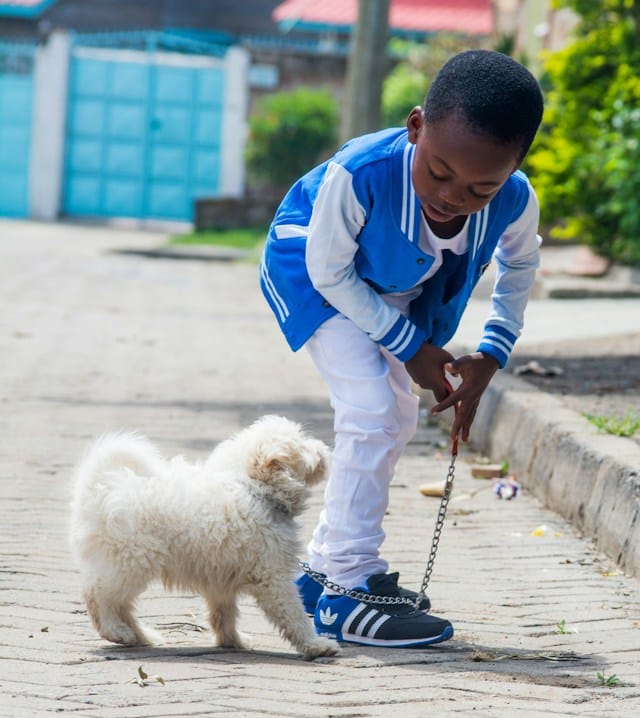The family dog jumping joyfully at the front door, a purring cat curled up on a child’s lap, or a chirping bird perched on a little finger – these are common scenes in homes worldwide. Owning an animal goes beyond the mere pleasure of having a cute, furry companion. Numerous studies have proven that pets have a positive impact on children’s development and health. The interaction with these non-human friends helps kids grow into emotionally stable, socially adept, and healthy individuals.
The Social Benefits of Pet Ownership
Owning pets often introduces children to a world of social interaction and responsibilities. At an early age, they learn to care for another living being, realizing that it relies on them for its well-being. This commitment can play a significant role in shaping their social abilities, developing their sense of empathy, and improving their self-esteem.
A lire aussi : How Do You Create a Balanced Diet for a Vegetarian Bird?
Developing Empathy through Animal Care
Pets provide an excellent opportunity for children to develop empathy, a crucial social skill. As children learn to read their pet’s needs and respond appropriately, they learn to understand and share the feelings of others. This acquired sensitivity can extend to their relationships with people, fostering a more caring and considerate behavior.
Boosting Self-Esteem through Pet Ownership
Taking care of a pet – feeding it, grooming it, and making sure it is healthy – gives children a sense of achievement and responsibility. These tasks can increase their self-esteem, instilling confidence in their abilities. A study conducted by the American Psychological Association found that children who cared for pets were more likely to have higher self-esteem and better social skills.
A découvrir également : How Can You Diagnose and Manage Epilepsy in Dogs?
The Emotional Benefits of Pets for Kids
Emotionally, pets can be our children’s best friends. They offer unconditional love and companionship, creating a comforting presence in a child’s life. They can help children cope with a range of emotions, serving as a source of solace during stressful times.
Pets as Emotional Support
Pets are often attuned to the emotions of their human companions. In times of distress, they can provide an unspoken comfort that children may not always get from their peers or even their parents. The presence of a loyal dog or a purring cat can be a soothing source of emotional support, helping children navigate their emotional landscape.
Pets and Childhood Anxiety
Several studies have indicated that pets can help reduce childhood anxiety, particularly among children with social anxieties or difficulties. Interacting with a pet can be a relaxing and stress-relieving experience for kids, acting as an antidote to their anxieties.
How Pets Promote Physical Health
Health benefits are another advantage of having pets. Regular walks with the dog, playing catch in the yard, or even chasing the family cat around the house gets children up and moving, contributing to their overall physical health.
Encouraging Physical Activity through Pets
Having a pet, particularly a dog, encourages children to engage in regular physical activity. Dogs need regular walks and playtime, which often falls in the duties of the child. This physical activity helps children maintain a healthy weight, increasing their fitness levels, and promoting a healthy lifestyle from a young age.
Pets and Allergy Prevention
Surprisingly, early exposure to pets can help prevent allergies in children. A study published in the Journal of Allergy and Clinical Immunology suggested that children who had been exposed to pets at an early age were less likely to develop allergies later on.
Pets and Children’s Cognitive Development
Pets can also assist in children’s cognitive development. Interactions with pets can stimulate a child’s imagination, curiosity, and foster their learning and understanding of the world around them.
Pets and Language Development
Pets offer children a safe and understanding audience to practice their language skills. As children talk to their pets, they learn to express themselves better and improve their communication skills.
Pets and Learning Responsibility
Pet ownership is a great way for children to learn responsibility. Taking care of a pet’s daily needs, such as feeding and grooming, teaches children about commitment and dependability, important life skills that contribute to their cognitive development.
It is worth noting that while pets indeed provide numerous benefits for children, the decision to bring a pet into your family should not be taken lightly. Consider the pet’s needs, your family’s lifestyle, and whether or not your household is ready for this new addition. After all, the wellbeing of the pet is just as important.
The Role of Companion Animals in Shaping Childhood Experiences
Companion animals, such as dogs and cats, play a significant role in enriching the experiences of young children. They provide a unique dimension to a child’s life that blends love, care, responsibility, and companionship. In this sense, pets are more than just animals; they are an essential part of the family that fosters a nurturing environment for child development.
Dogs, Cats, and Social Interaction
Pets, particularly dogs and cats, promote social interaction both within and outside the family. Children who own pets are more likely to engage with others, fostering a sense of community and belonging. For instance, walking a dog often leads to conversations with neighbors, teaching children the value of being part of a community. Moreover, pets also provide a common ground for interaction among children and adolescents, helping them build friendships and social networks.
The Emotional Health Impact of Pets
Pets have a profound effect on the emotional health of children. The bond between a child and their pet can contribute significantly to the child’s emotional wellbeing. Pets provide comfort in difficult times, celebrate joyous moments, and stay as a constant companion offering unconditional love. This emotional bond with pets can help children develop their capacity for empathy, kindness, and understanding.
The Influence of Pet Owning on Cognitive Development
Pet owning creates an environment where children can enhance their cognitive development. The tasks associated with pet care such as feeding, grooming, and health check-ups require planning, organization, and time management. These tasks teach children the importance of responsibility, commitment, and problem-solving. Additionally, pets can also stimulate creativity and curiosity in children, promoting learning and intellectual growth.
The Benefits of Dog Ownership on Mental Health
Specifically, dog ownership has been linked with improved mental health in children and adolescents. Dogs, with their playful nature and companionship, can provide significant stress relief, leading to better mental health outcomes. The physical activity associated with dog care, such as walking or playing, also contributes to improved mood and reduced anxiety.
Conclusion
In light of the numerous benefits, the impact pets have on the overall development of children is undeniable. They enhance social interaction, contribute to emotional health, promote cognitive development, and improve mental health. Therefore, pet ownership can be an enriching experience for children, fostering growth and development in unique and profound ways.
However, it’s essential to remember that each family’s readiness and ability to care for a pet vary. Therefore, it’s crucial to carefully consider the responsibilities that come with pet ownership and ensure that the wellbeing of the pet is a priority. After all, the bond between pets and their owners is a reciprocal relationship, built on mutual care, respect, and love.











